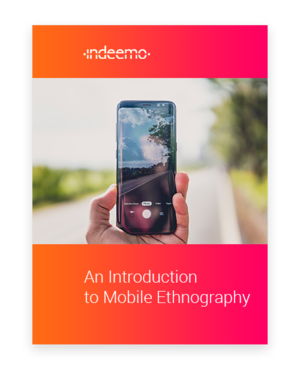Mobile Ethnography White Paper
Learn how Mobile Ethnography can supplement your research projects and generate richer contextual insights for your brands.

This case study explores the brand perception, motivations and path to purchase for Gen Z consumers for a major global consumer brand using a competitors user set as the respondent set.

The leading consumer brand noticed their core demographic of users was ageing, and they were gaining little traction amongst Gen Z consumers.
Given Gen Z are the ‘future of technology’, they wanted to understand why they were losing market share and what were the primary motivations to purchase for these consumers?

Using a mix of Indeemo’s media upload types of photos, videos, notes and screen recordings, tasks were released in a scheduled manner over 1 week.
Tasks ranged from:
1/ Show us ‘your room’ ( 1-minute selfie video in your bedroom)
2/ Show us what is important to you through photos (Show us what you spend your time doing on your phone, looking at and following. We’re interested in your favourite websites/ apps/ games/ social).
3/ Show what apps you have on your phone.
Additional more targeted tasks included:
1/ Respondents sharing their motivations around their first phone purchase which they described in short videos.
2/ Their opinions of leading consumer brands (prompted) shared via using the Mobile screen recording app to navigate to the website and outline their thoughts.
The end client claimed ‘this is the closest we have ever been to our consumers’.
The research generated significant enthusiasm in the leading brand (end client) given they were finally able to generate a range of insights from a consumer segment they have found difficult to reach.
The respondent engagement was excellent, due primarily to great moderation.
They found that parents had a lot to play in the adoption of leading brands in Gen Z’s life. Socio-economic factors also played a part, with product choices not always representing what they wanted exactly concerning their choice of product (given economic considerations).

This study required excellent moderation - there were 3 moderators on the English segment of this project alone. Respondents required encouragement and engagement by probing from moderators. It was also essential that all respondents had enabled push notification on their phones to enable moderators to directly communicate with the Gen Z’ers users (compared to using email to communicate.)
This study also had a test run with some pilot Gen Z’ers to see if the tasks were engaging enough and not too overwhelming. As a result, the agency followed on by tweaking the tasks slightly.
The task list was not too long, with each day requiring respondents to focus on a separate topic.
In short, the client was delighted with the insights generated.
Mobile Ethnography is a rich, agile way to get a deeper understanding of participants’ everyday lives and behaviors.
Projects can range from a few days to as long as a year but are typically 1 to 2 weeks in duration.
After analysing the engagement on hundreds of projects, we have learned a lot about how to optimize research for mobile and can activate your Mobile Ethnography projects in as little as one working day.
We’re looking forward to speaking with you.



Learn how Mobile Ethnography can supplement your research projects and generate richer contextual insights for your brands.
